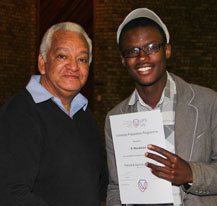Latest News Archive
Please select Category, Year, and then Month to display items
19 November 2018
|
Story Charlene Stanley
|
Photo Charlene Stanley
 Prof John Mubangizi, Dean of the Faculty of Law, encouraged delegates at the Fifth Annual International Mercantile Conference to share ideas on best international practice in their various fields.
Prof John Mubangizi, Dean of the Faculty of Law, encouraged delegates at the Fifth Annual International Mercantile Conference to share ideas on best international practice in their various fields.
“Don’t say anything online that you wouldn’t want plastered on a billboard with your face on it.”
This famous quote by international tech expert Erin Bury should be a guiding light when it comes to online habits in the workplace, according to Francois Cilliers, UFS Lecturer in Mercantile Law.
In his presentation Could Social Media be the Gateway to Employment Discrimination? he warned that employees have a responsibility not to bring their employers in disrepute through their comments on social media.
“Posts, updates, tweets, and comments are considered to be publications and can therefore never be seen as privileged information,” he explained.
Responsibility on employees and employers alike
He pointed out that employers also had a responsibility regarding the way in which they use the information about prospective employees obtained via social media.
“Nowadays, approximately 75% of companies hire through social media. In the US, recruiting companies spend hours researching candidates, making full use of what they can find on social media. It was found that 50–80% of employers frowned upon posts and pictures featuring drug and alcohol abuse, profanity, and bad grammar.”
He warned that employers needed to tread lightly, as a decision not to employ someone as a result of information on the prospective employee’s political views and sexual orientation could constitute unfair discrimination as set out in the Employment Equity Act.
“An employer who wishes to use a screening process (utilising social media) has to prove that the information and the process is objectively necessary and can be justified with reference to the inherent requirements of the job,” he explained.
“As technology and electronic systems advance, so too should the applicable labour laws.”
Cilliers’ presentation formed part of the Fifth Annual International Mercantile Law Conference recently hosted by the Faculty of Law on the Bloemfontein Campus.
Incorporating new technology in teaching and research
“This conference is an opportunity to share ideas on best practice in what is perceived as a ‘difficult’ field within Law,” said Prof John Mubangizi, Dean of the Faculty of Law, as he opened the proceedings. Topics in the discussion sessions ranged from Racism in the workplace and The underrepresentation of females in the judiciary, to Decriminalisation of cannabis: A recipe for healthy employer-employee relations?
“Conferences such as these help us to take advantage of the newest developments in technology to advance our teaching and research,” said Prof Mubangizi.
“To quote Einstein: ‘We can’t solve problems by using the same kind of thinking we used when we created them.’”
Mid-year prize-giving ceremony for UPP and Extended Programme students
2012-09-20
 |
Prof. Neil Heideman, Dean of the Faculty of Natural and Agricultural Sciences, with top achiever Buyisani Masabalala.
20 September 2012 |
With a subject percentage of 94% in Chemistry and 89% in Mathematics, Buyisani Masabalala is at the top of his class. The student, who is part of the University Preparation Programme (UPP) offered on the South Campus of the University of the Free State, was named top student in the Natural Sciences for students in the programme.
Buyisani and 28 other students on the UPP and Extended Degree programme, received certificates at a prize-giving ceremony held on the South Campus. They were top performers during their first six months in all subjects on the UPP and Extended Degree programme. The UPP is a one-year bridging programme for students who do not meet the initial admission requirements for mainstream studies at a university. The extended degree programme caters for students who do meet mainstream university admission requirements but have a lower admission score.
With their excellent results, Buyisani and the other top achievers are now one step away from entrance into mainstream studies. They are now awaiting their final results that will be out at the end of the year. As an incentive to study even harder, the UPP top achievers in the Faculties of Humanities, Economic and Management Sciences, Natural and Agricultural Sciences and Agricultural Sciences and Education will each receive a bursary at the end of the year. The same applies for top achievers in the B Com and BSc Extended Programme and the Vocational Directed Preparation Programme top achievers.